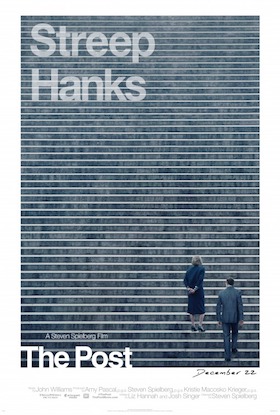The right movie for the right moment directed by the right man at the wrong time, The Post has a lot of interesting things to say, yet often gets in the way of itself when trying to say them. And while this film was never going to suck, not with Steven Spielberg behind the camera, and Tom Hanks, Meryl Streep, Bob Odenkirk, and Sarah Paulson in front of it, one can’t help but to think how much better it may have been with a tighter script and a more audacious director.
The Post largely takes place during a few turbulent weeks in 1971 when The Washington Post managed the dual struggle of working a landscape-changing story while in the midst of an initial public offering. On the one side there is the paper’s editor, Ben Bradlee (Hanks), whose ass is raw from all the scoop spankings The New York Times has been giving him the last few years. On the other side of the table is the paper’s owner, Kay Graham (Streep), who recently inherited the Washington Post from her late husband, and is trying to appease board members and investors with the IPO.
The pair find themselves in a pickle when they get their hands on a cache of classified documents (later known as “The Pentagon Papers”), which Richard Nixon’s White House is trying to keep secret. These documents represent internal Pentagon and Defense Department assessments of the war in Vietnam, which show that administrations leading back to Truman knew that there was no real victory possible for the U.S. Bradlee learns that The New York Times already has the story, yet they can’t move on it since Nixon’s lawyers have filed a court injunction against their publication.
Hungry for the scoop, Bradlee and the Washington Post must play catch-up on the investigation, then decide whether it is worth bringing Nixon’s wrath down on them: a decision that lands squarely on Kay’s shoulders. Kay doesn’t have experience running a newspaper, and while smart, she appears entirely out of her element throughout much of the picture; she spends a lot of the movie running into things, being run into, and generally getting pushed around. Although Streep plays the role with a deliberate pensiveness that fits in with her characterization as-written, it seems like an awful waste of her talents considering the gaps the script has when it comes to female agency.
And as it concerns strong, active participation in the development of events in The Post, as James Brown once said, “this is a man’s world.” For example, Sarah Paulson appears in just a handful of scenes in a criminally underutilized role as Mrs. Ben Bradlee. Paulson gets about three good minutes of screen time near the end of the film to remind her husband what it means to be a journalist and an American, then fades into the background again. Like Paulson’s character, Streep exists in this world to sit nervously on the sidelines while the men do the heavy lifting, only to swoop in and remind the boys about integrity and justice at the 11th hour. Ostensibly, Spielberg presents these women as humanizing opinion makers, yet their only function in the mechanics of the narrative is to act as a moral compass to more involved men.
It leads one to wonder why Paulson and Streep were even invited to this party, since their only real purpose in The Post is to shrug, remark that they don’t know what to do, but that they know what’s right. There’s no fault to be found in the acting that actually does sell a lot of this cheese, which…well, might answer the question about why Spielberg got Streep and Paulson into these roles. It’s hack writing, and this movie needs good acting to sell it.
To compound these script issues, the movie stops a few different times during the third act so that characters can give speeches that outline previously unspoken motivations. It is telling instead of showing at its laziest, and is hardly the kind of personal archaeology one would expect from a director who made his bones combining crisp action with heartfelt and genuine character work. This is a fine press procedural, to be sure, yet this is not peak Spielberg. The director seems to be crafting moments, here, not character-infused narratives, and the picture suffers for it.
Which is all to say that while it has problems, The Post is unquestionably a good movie: it’s just not what one might expect considering the pedigree of those involved. The pacing is brisk, the development of the journalistic investigation works well as a companion to the IPO drama Kay deals with, and the performances are stellar from top to bottom. As already mentioned, it is a timely story, and when The Post needs a good moment to sell itself, Spielberg and co. deliver it. Yet aside from the anemic character work, it is packaged a little too neatly, and all the spinning camera moves and soft lighting in the world can’t save it from becoming what Spielberg has fallen into during this 21st century: safe and boring.
The Post does alright for itself, and tells an engaging story using the best talent money and Hollywood connections can buy. Bob Odenkirk stands out in a cast of standouts as the most interesting and dynamic component in all of this, as reporter Ben Bagdikian, yet even he can’t save a middling-to-decent effort by a director who is coasting on skills developed decades ago, skills that are in desperate need of a sharpening.









Comments on this entry are closed.